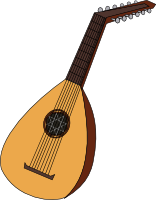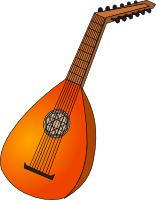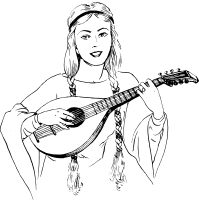Associations to the word «Lute»
Noun
- Harpsichord
- Olson
- Harp
- Mandolin
- Orpheus
- Fiddle
- Cymbal
- Fret
- Rift
- Flute
- Bassoon
- Oboe
- Accompaniment
- Instrument
- Minstrel
- Banjo
- String
- Tuning
- Viola
- Bach
- Violin
- Pear
- Cello
- Recorder
- Baroque
- Lyra
- Playing
- Chord
- Renaissance
- Weiss
- Rune
- Guitar
- Prelude
- Repertoire
- Consort
- Sing
- Melody
- Fugue
- Ensemble
- Bard
- Soprano
- Peg
- Trumpet
- Singing
- Concerto
- Octave
- Quixote
- Percussion
- Conservatory
- Gao
- Sang
- Lullaby
- Stefano
- Mae
- Solo
- Suite
- Composer
- Drum
- Stark
- Tenor
- Pipe
- Notation
- Apollo
- Milano
- Tune
- Musician
- Uzbek
- Johann
- Leopold
- Keyboard
- Francesco
- Ming
Adjective
Pictures for the word «Lute»
Wiktionary
LUTE, noun. A fretted stringed instrument of European origin, similar to the guitar, having a bowl-shaped body or soundbox; any of a wide variety of chordophones with a pear-shaped body and a neck whose upper surface is in the same plane as the soundboard, with strings along the neck and parallel to the soundboard.
LUTE, verb. To play on a lute, or as if on a lute.
LUTE, noun. Thick sticky clay or cement used to close up a hole or gap, especially to make something air-tight.
LUTE, noun. A packing ring, as of rubber, for fruit jars, etc.
LUTE, noun. (brickmaking) A straight-edged piece of wood for striking off superfluous clay from mould.
LUTE, verb. To fix or fasten something with lute.
LUTE GUITAR, noun. (musical instrument) A stringed instrument that combines a normal guitar six-string layout over a lute-like bowl-shaped body, originating in German folk traditions.
LUTE GUITARS, noun. Plural of lute guitar
LUTE TURTLE, noun. The leatherback.
LUTE TURTLES, noun. Plural of lute turtle
Dictionary definition
LUTE, noun. A substance for packing a joint or coating a porous surface to make it impervious to gas or liquid.
LUTE, noun. Chordophone consisting of a plucked instrument having a pear-shaped body, a usually bent neck, and a fretted fingerboard.
Wise words
Kind words can be short and easy to speak, but their echoes
are truly endless.







